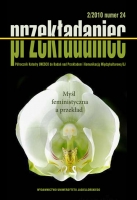„Kobietystka”: neologizm a doświadczenie egzystencjalne Afroamerykanki
"Womanist": Neologism and Existential Experience of the African American Woman
Author(s): Marta MazurekSubject(s): Language and Literature Studies
Published by: Wydawnictwo Uniwersytetu Jagiellońskiego
Keywords: African American woman; “womanist”; la mestiza; “talking book”; neologism; mimic; Chikwenye Okonjo Ogunyemi; Rosemarie Putman Tong; Alice Walker
Summary/Abstract: The article attempts to explain and justify why the Polish translators Bożena Umińska and Jarosław Mikos introduced the neologism kobietystka as a Polish counterpart of the word “womanist,” coined by Alice Walker, in their 2002 translation of Rosemarie Putnam Tong’s Feminist Thought: A More Comprehensive Introduction. Alice Walker’s choice of the term “womanist” for colored feminists is rooted in both the African American praxis of mimicry and the African American literary tradition defined as the “talking book” metaphor. On the one hand, Walker’s term, coined in the early 1980s, serves to both emphasize her ethnic identity of an African American woman and to point out her political situation in a white-dominated American society. On the other hand, the introduction of the new word in order to define a feminist who is a colored woman is seen as a separatist gesture expressing critique of second wave feminist politics and discourse, which were totally dominated by middle-class white women. As Walker and other womanists quoted in the text explain, since feminism was linked solely with white Western culture, it excludes colored women because its agendas do not relate to their tradition and everyday struggle against American racism and class discrimination. Considering Walker’s 1974 essay In Search of Our Mothers’ Garden, in which she quotes Virginia Woolf’s passages related to African American women’s historical experience, Walker’s strategy can be viewed as paradigmatic, and the writer’s coining of the new word “womanist” should be understood as analogical. The article also explains how the introduction of the neologism kobietystka by the Polish translators aims to indicate a specific ethnic identity of colored women’s movement. The translators’ choice proves their sensitivity to the cultural context which gave birth to the term “womanist”.
Journal: Przekładaniec.
- Issue Year: 2011
- Issue No: 24
- Page Range: 247-262
- Page Count: 16
- Language: Polish

